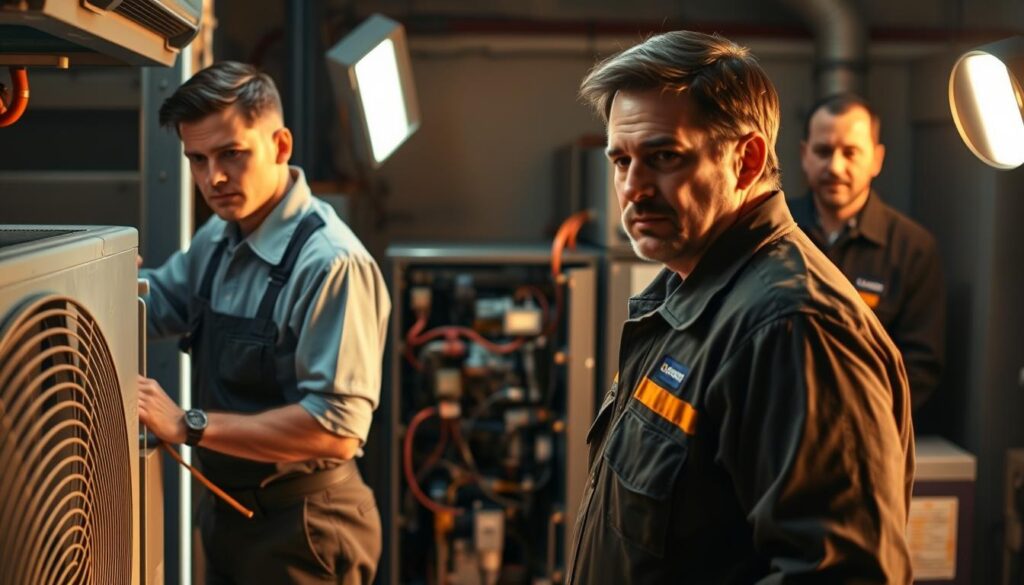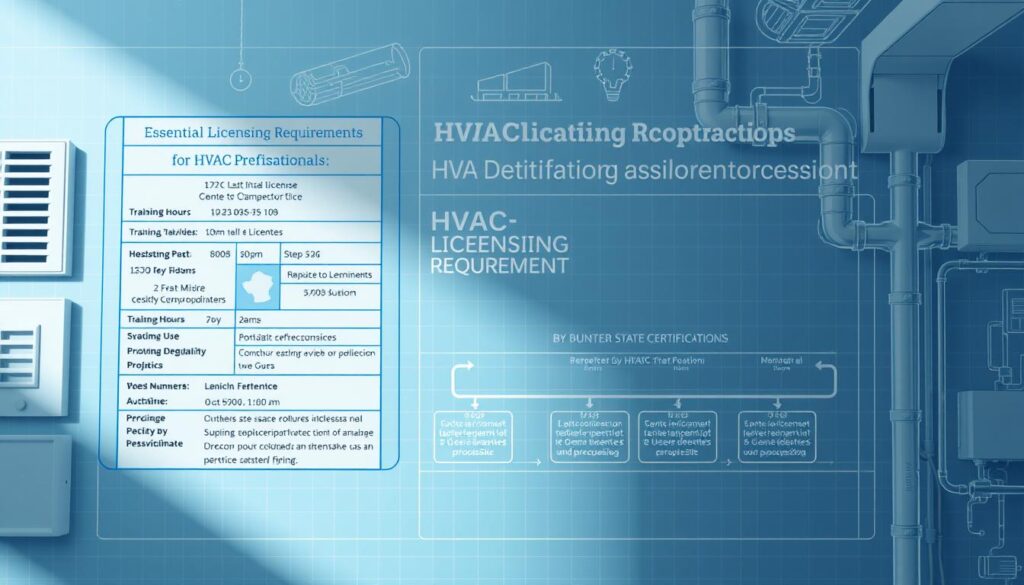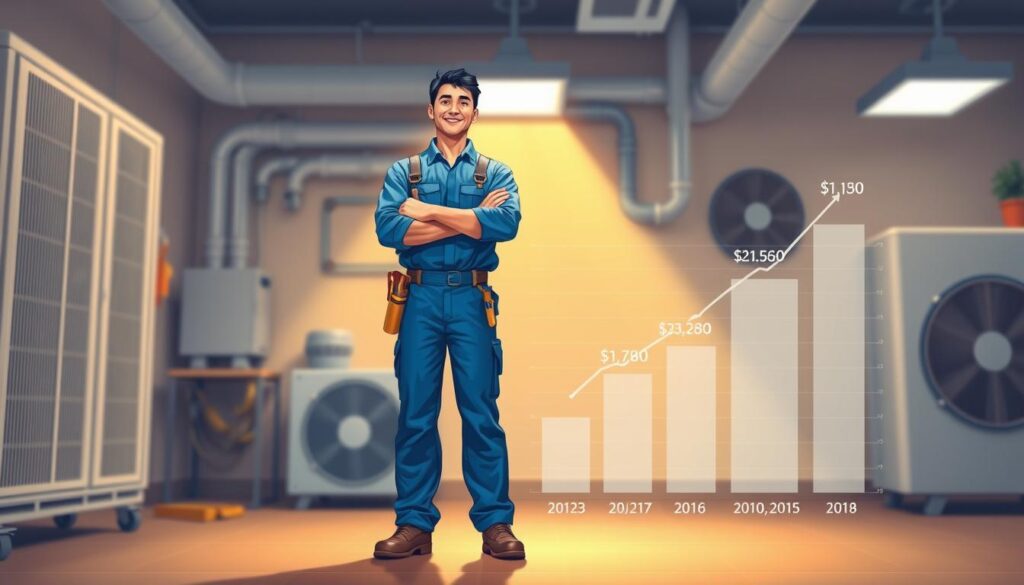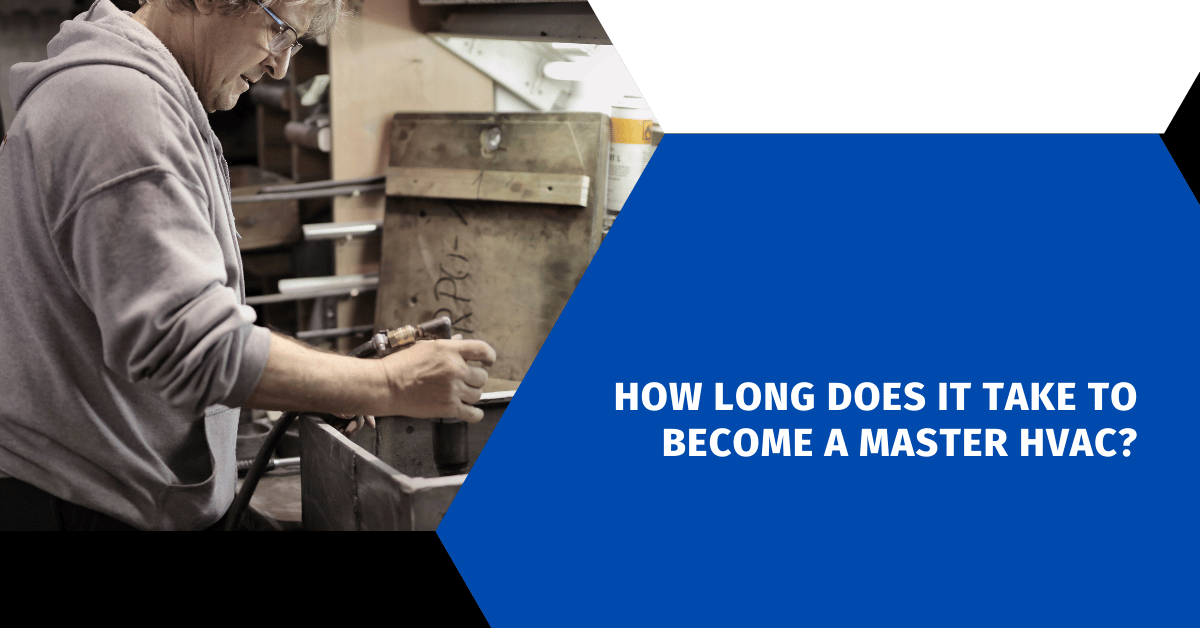Affiliate Disclosure
HVAC Guide Guys is a participant in the Amazon Services LLC Associates Program, an affiliate advertising program designed to provide a means for sites to earn advertising fees by advertising and linking to Amazon.
How Long Does It Take to Become a Master HVAC? Ever wondered how many years it takes to become a top HVAC pro? The path to master HVAC status is more than just technical skills. It’s a journey of dedication, precision, and continuous learning.

The HVAC career offers great chances for those ready to put in the effort. The U.S. Bureau of Labor Statistics says HVAC technician jobs will grow 4% by 2026. This shows a bright future for those who want to join.
Becoming a master HVAC technician takes time and hard work. It usually takes 3-5 years of training, practical experience, and ongoing learning. Your journey will include apprenticeships and advanced certifications, making it both tough and rewarding.
Key Takeaways
- HVAC career path requires 3-5 years of apprenticeship
- Minimum 12 months of practical experience is key
- EPA certification is needed for refrigerant work
- There are many certifications for specific skills
- Keep learning to move up in your career
Table of Contents
Understanding the HVAC Technician Career Path
The HVAC industry is full of exciting opportunities for those who love technical work. You’ll learn to work with complex systems that make homes and businesses comfortable. This is a vital role that keeps everyone happy and healthy.
There are many paths to follow in the HVAC field. It’s a growing field, with a 4% increase in jobs expected by 2029. This means more chances for skilled people to find work.
Role and Responsibilities of HVAC Professionals
HVAC technicians are key to keeping systems running smoothly. They install, repair, and maintain heating, cooling, and ventilation systems. Their main tasks include:
- Diagnosing system performance issues
- Installing and repairing complex HVAC equipment
- Conducting routine maintenance checks
- Testing system components for optimal functionality
- Providing customer service and technical recommendations
Industry Growth and Career Opportunities
The HVAC industry is booming, with many specializations to choose from. HVAC technicians earn a median of $50,590 a year. The best performers can make up to $64,000 annually.
Skills Required for Success
To succeed in HVAC, you need technical and soft skills:
- Strong mechanical aptitude
- Electrical and technical knowledge
- Problem-solving capabilities
- Physical stamina
- Excellent communication skills
Top growth states for HVAC technicians include Utah (31.1%), Nevada (30.1%), and Colorado (29.7%). These places offer great opportunities for those starting their HVAC careers.
Educational Requirements for HVAC Certification
To become a certified HVAC pro, you need to follow certain educational steps. First, you must understand the basic requirements for HVAC certification. This is the starting point for your technical career.
Most places require specific education to start in HVAC. You need at least a high school diploma or GED. HVAC training lasts from 6 months to 3 years. It covers all the key technical skills you need.
- Community college certification programs
- Technical school specialized training
- Vocational institution courses
- Apprenticeship opportunities
Your HVAC training will include a lot of in-depth classes. You’ll learn about:
- Heating technology basics
- Refrigeration mechanics
- Air conditioning systems
- Technical math
- Electrical system knowledge
Getting hands-on experience is key. Most programs include practical training. This helps you gain the skills needed for HVAC certification. State rules vary, but usually, you need both classroom learning and work experience.
By choosing accredited programs and meeting state licensing needs, you’re set for a great HVAC career.
Explore Our HVAC Shop
Looking for top-rated HVAC tools, parts, and accessories? Visit our shop and find the perfect solution for your needs.
Visit the ShopHow Long Does It Take to Become a Master HVAC?
Becoming a master HVAC technician takes time, effort, and learning. The time needed varies based on several factors. Generally, it takes several years to gain the necessary skills.
Traditional Training Timeline
The traditional path includes:
- 6-12 months for initial certificate programs
- 2 years for an associate’s degree in HVAC training programs
- 4 years of apprenticeship and on-the-job training
Accelerated Program Options
For those who want to move faster, there are quicker options:
- Intensive certificate programs: Can be finished in 8-18 months
- Specialized technical institutes with shorter curricula
- Online and hybrid learning options
Factors Affecting Duration
Several factors influence your journey to becoming a master HVAC technician:
- State licensing requirements
- How quickly you learn
- Any prior mechanical experience
- Availability of apprenticeship opportunities
Different states have unique requirements, with experience ranging from 18 months to 4 years before qualifying for licensing exams.
The job outlook for HVAC technicians is strong, with a 5% growth from 2021 to 2031. This makes it a stable and rewarding career for those who invest in their development.
Explore Our HVAC Shop
Looking for top-rated HVAC tools, parts, and accessories? Visit our shop and find the perfect solution for your needs.
Visit the ShopHVAC Training Program Options
Choosing the right HVAC training program is key to a successful career in heating, ventilation, and air conditioning. There are many ways to become a skilled HVAC technician. Each option has its own benefits and things to think about.
- Trade School Certificates
- Community College Programs
- Apprenticeship Programs
- Online Training Courses
HVAC apprenticeships last from 2 to 5 years. They mix classroom learning with practical training. Getting EPA Section 608 certified is a must for all HVAC techs.
| Program Type | Duration | Average Cost |
|---|---|---|
| Certificate Program | 6-12 months | $1,200 – $5,000 |
| Associate Degree | 18-24 months | $5,000 – $15,000 |
| Apprenticeship | 2-5 years | Paid training |
Think about your career goals, budget, and how much time you have when picking a program. Many programs help find you a job, which is great for starting your HVAC career.
“The HVAC industry offers incredible opportunities for those willing to invest in their education and skill development.” – Industry Expert
Your choice will affect how long your apprenticeship lasts and your future job prospects. Look into local programs, talk to professionals, and pick what fits your career goals best.
Apprenticeship Requirements and Duration
Starting your HVAC career needs a solid apprenticeship. This combines classroom learning with real-world experience. Apprenticeships last from three to five years, giving you deep training to become a pro.
As an HVAC apprentice, you’ll learn a lot and get hands-on experience. To join, you need to meet certain requirements:
- High school diploma or equivalent
- Minimum age of 18
- Physical fitness to perform technical tasks
- Basic math and reading comprehension skills
On-the-Job Training Components
You’ll get vital experience through supervised work. Apprentices do 8,000 to 10,000 hours of practical training with experts.
Apprenticeship Program Structure
| Training Component | Hours/Duration |
|---|---|
| Classroom Instruction | 1,230 hours |
| Supervised Work Experience | 8,000-10,000 hours |
| Total Program Duration | 3-5 years |
Completing Required Hours
To finish your apprenticeship, you must meet strict training rules. You’ll need to log your work hours, attend classes, and show you know your stuff about HVAC systems.
With hard work and commitment, you’ll go from apprentice to skilled HVAC pro. You’ll be ready to handle tough technical jobs in the field.
Explore Our HVAC Shop
Looking for top-rated HVAC tools, parts, and accessories? Visit our shop and find the perfect solution for your needs.
Visit the ShopState Licensing and Certification Process

The HVAC licensing process can be tricky, as rules change from state to state. It’s key for those starting in HVAC to know the certification needs. This knowledge is vital for a fulfilling career in this field.
Here are the main parts of the HVAC licensing process:
- Minimum age requirement of 18 years
- Documented practical experience
- Successful completion of state-specific examinations
- Proof of technical education or apprenticeship
- Background check and insurance requirements
Getting licensed often means having at least 48 months of supervised practical experience in air-conditioning and refrigeration. Some states might accept 36 months of experience plus 12 months of certified training.
Applicants usually need to:
- Complete an approved HVAC training program
- Get verified work experience
- Pass a state licensing exam
- Keep up with continuing education credits
Licensing costs vary, from $50 to $115, and licenses last a year. The rules for Class A and Class B licenses differ. They decide what HVAC systems you can work on.
It’s smart to check the HVAC licensing process for your state. Rules can change a lot. Knowing the certification needs helps you succeed in HVAC.
Explore Our HVAC Shop
Looking for top-rated HVAC tools, parts, and accessories? Visit our shop and find the perfect solution for your needs.
Visit the ShopJourney to Master HVAC Status
Getting from a journeyman to a master HVAC technician takes hard work, lots of experience, and never-ending learning. Your journey to becoming a top HVAC pro involves planning your career and getting special training.
Experience Requirements for Master Status
To move up to master status, you need a lot of experience. Most places ask for:
- 5-7 years of HVAC work experience
- At least 8,000 hours of on-the-job training
- Deep knowledge of complex HVAC systems
Advanced Certifications Needed
To show you’re ready for master-level status, get advanced certifications like:
- North American Technician Excellence (NATE) certification
- HVAC Excellence Professional Level certification
- EPA Section 608 Universal Certification
Continuing Education Strategies
Keeping up with hvac education is key to keeping and growing your skills. Top HVAC masters spend on:
| Education Type | Annual Hours | Key Focus Areas |
|---|---|---|
| Technical Workshops | 16-24 hours | Emerging Technologies |
| Online Courses | 12-20 hours | Energy Efficiency |
| Industry Conferences | 8-16 hours | Networking |
“Continuous learning is the minimum requirement for success in the HVAC industry.” – HVAC Industry Expert
Investing in your growth keeps you ahead and valuable in the fast-changing HVAC world.
Explore Our HVAC Shop
Looking for top-rated HVAC tools, parts, and accessories? Visit our shop and find the perfect solution for your needs.
Visit the ShopSalary Expectations and Career Growth

Starting a career in HVAC can lead to great financial rewards. The HVAC field offers a wide range of earning possibilities. These grow as you gain more experience and skills.
At the beginning, HVAC technicians earn about $52,300 a year. Their hourly pay starts at $25.14. As you move up and aim for the master hvac technician exam, your salary will rise significantly.
| Career Stage | Annual Salary | Hourly Rate |
|---|---|---|
| Entry-Level (0-2 years) | $52,300 | $25.14 |
| Intermediate (2-4 years) | $63,500 | $30.53 |
| Senior (4-6 years) | $74,500 | $35.82 |
| Supervisory (7+ years) | $87,700 | $42.16 |
Your career can grow in many ways:
- Specializing in certain HVAC systems
- Getting into management roles
- Starting your own business
- Reaching advanced technical positions
Salaries can differ based on where you work. The highest-paying states are:
- California: $57,000
- New Jersey: $56,000
- Washington: $55,900
The HVAC sector is expected to create 23,000 new jobs by 2032. This is a great time to improve your skills and get certifications. These can increase your earnings.
Conclusion
Starting an HVAC career needs dedication, planning, and always learning. Knowing how long it takes to become a master HVAC tech is key. It usually takes four to six years, with lots of training, certifications, and hands-on experience.
Your career will have many steps. First, you’ll get certified in six months to two years. Then, you’ll do an apprenticeship for 2,000 hours. Your hard work can pay off, with salaries from $50,590 to over $79,630 in places like Alaska and Washington.
To succeed in HVAC, you must know more than just tech. You’ll need to keep up with new tech, get advanced certifications, and always grow professionally. With job growth and many specializations, your career can be stable, well-paid, and fulfilling.
Being a master HVAC tech is a lifelong journey of learning and improving. By investing in your education, getting practical experience, and getting certifications, you can have a rewarding and exciting career in this vital field.

